Pay Per Click Optimization: An Expert's Guide to Beating Bloated Agencies
- Chase McGowan

- Aug 4, 2025
- 16 min read
Pay-per-click optimization isn't just about launching ads. It's the hands-on, continuous process of refining your campaigns to squeeze every drop of value from your ad spend. Think of it as a cycle: you audit, you test, and you adjust everything—from keywords and ad copy to bids and audiences—all to hit your specific business goals, whether that's slashing costs or boosting conversions.
This is where my expertise comes in, long after the initial setup is complete. It’s where I outperform the competition.
The Agency Dilemma in PPC Optimization
So many businesses I talk to are stuck in the same frustrating loop. They're paying hefty monthly retainers to an overpriced, bloated PPC agency, only to see their results flatline. The agency sold them on the idea of a big team, but what they got was an assembly-line approach to pay per click optimization that rarely moves the needle.
This model is fundamentally broken for businesses that need more than just basic account maintenance. Your advertising budget, one of your most critical growth levers, ends up in a system built for agency scale, not your specific success.
The core of the problem? It often boils down to who is actually running your account. In many of these bloated agencies, your campaigns get passed down to a junior account manager. They're armed with a standardized playbook and apply the same generic strategies to every client, completely ignoring the nuances of your industry or unique business goals. They’re learning on your dime.
The Missing Ingredient Is True Expertise
This one-size-fits-all approach is the enemy of genuine optimization. Real, effective PPC demands deep, specialized expertise and a manager who is personally invested in your wins and losses. It takes more than pulling automated reports; it requires a seasoned expert like me who can actually read between the lines of the data, spot the hidden opportunities, and build a truly custom strategy from the ground up.
This is especially critical in PPC, where the feedback loop is immediate and unforgiving.
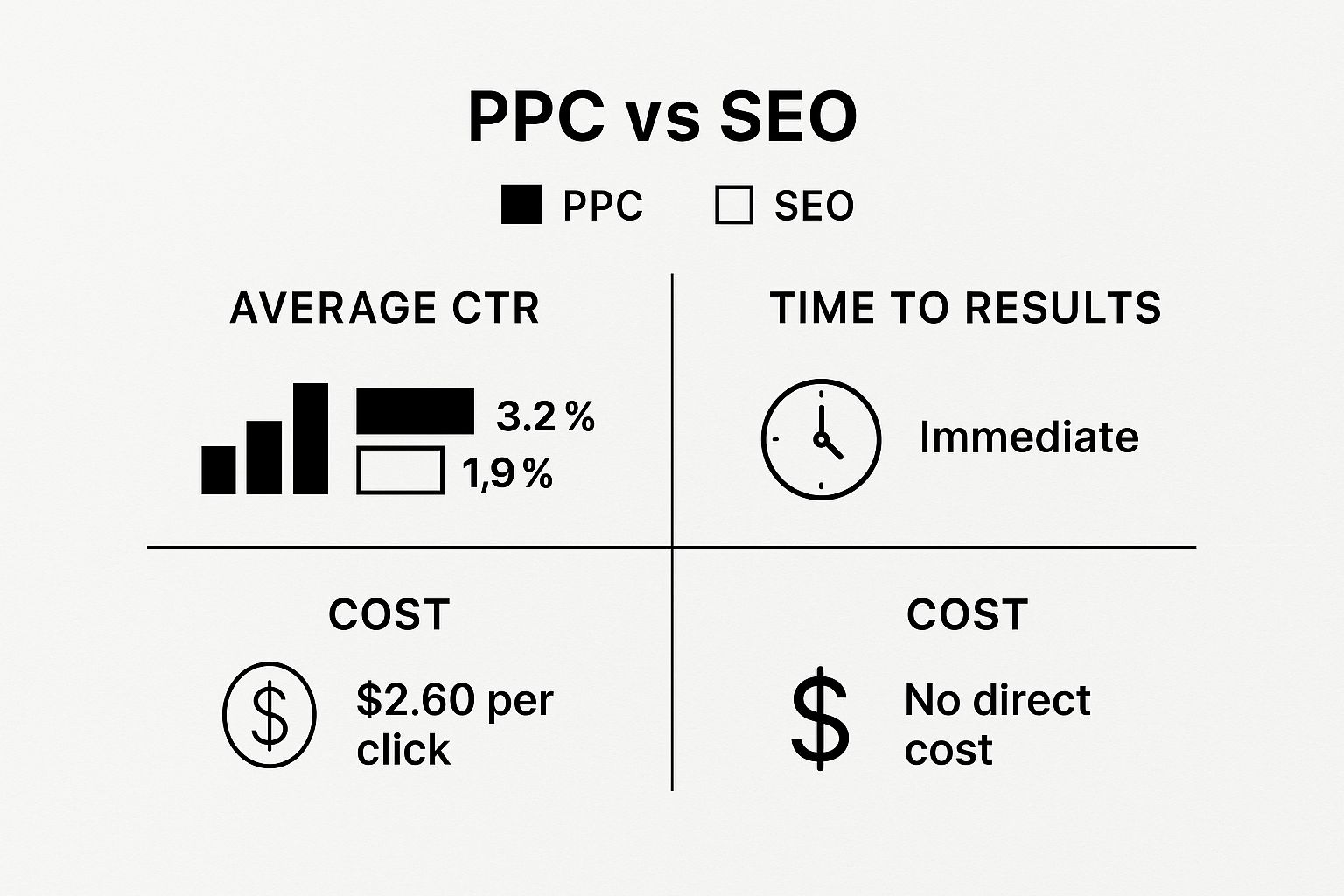
The data here tells a clear story. PPC gets you traffic now, but its cost-per-click nature means that without my precise, expert-led optimization, you can burn through your budget in a flash with very little to show for it.
A Flawed Model for a Growing Market
And the stakes are only getting higher. The global pay-per-click advertising market is exploding, with projected spending expected to hit $190.5 billion. With the U.S. alone making up about 35% of that spend, the competition is absolutely brutal. This massive investment makes it crystal clear: you need sharp, effective optimization from a specialist to avoid getting lost in the noise. For a deeper dive into these numbers, you can explore the detailed pay-per-click statistics from We Can Track.
This intense competition is where the agency model truly cracks under pressure. I see the same pain points over and over again:
High Fees, Low Attention: A huge slice of your retainer goes to covering the agency's fancy office and sales team, not to my level of dedicated time on your account.
Generic Strategies: Your account is treated like a template. It gets a cookie-cutter strategy that ignores what makes your market and your customers unique.
Lack of Personal Investment: To an agency, your success is just another row on a spreadsheet. There’s no genuine partnership, just a focus on retaining your monthly fee.
The table below breaks down the fundamental differences between working with a hands-on consultant like me versus a typical large agency. It's a choice between a partner and a vendor.
Consultant Expertise vs Agency Scale A Strategic Comparison
Attribute | Independent Consultant | Large Agency |
|---|---|---|
Account Management | You work directly with me, the senior expert running your campaigns. | Your account is often handled by a junior manager, with seniors far removed. |
Strategy | 100% custom, built around your specific margins, goals, and market. | Often relies on standardized playbooks and templates for efficiency. |
Incentives | My success is directly tied to your performance and ROI. A win for you is a win for me. | Focused on client retention and agency-wide revenue targets. |
Communication | Direct, transparent, and focused on strategic insights. No layers of bureaucracy. | Can be slow and filtered through multiple points of contact. |
Cost Structure | Lean and transparent. Your fee pays for my expertise, not overhead. | Fees are inflated by sales teams, management layers, and office costs. |
Ultimately, the choice comes down to what you value more: the perceived safety of a large-scale operation or the tangible results that come from my dedicated, senior-level expertise.
The core difference lies in accountability. My success is directly tied to your success. I am not just managing an account; I am building a partnership focused on delivering a tangible competitive edge. This starkly contrasts the agency approach, where your business is often just another number in a large portfolio, managed by someone learning on your dime.
Building Your Foundation with a Forensic Account Audit

This is the first area where the value of a dedicated expert becomes undeniable. A forensic account audit goes far beyond the surface-level, automated reports that bloated agencies use to justify their retainers.
It’s a meticulous, hands-on investigation I conduct into every corner of your Google Ads account to uncover hidden inefficiencies and opportunities.
Most agencies simply don’t have the time, incentive, or senior-level expertise to perform this kind of deep dive. Their model is built on volume, meaning your account gets a standardized once-over. As an independent consultant, my success is directly tied to yours. That's why I start every engagement by acting like a detective, determined to find every dollar of wasted ad spend.
Uncovering Hidden Profit Drains
The goal of a forensic audit isn't just to see what’s working; it's to find what's broken. Many accounts are bleeding money in ways that generic reports will never show. My experienced eye knows exactly where to look for these profit drains that are silently sabotaging your pay per click optimization efforts.
Here are a few common culprits I uncover week after week:
Keyword Cannibalization: This happens when multiple ad groups are competing against each other for the same keywords. You're essentially bidding against yourself, driving up costs for no reason. Agencies often create this problem by using overly broad campaign structures.
Poor Match Type Strategy: Relying too heavily on broad match keywords without a robust negative keyword list is one of the fastest ways to waste money. It pulls in irrelevant search traffic that clicks your ads but will never convert.
Broken Ad Funnels: Your ad might be great, but does it lead to a landing page that delivers on the promise? I frequently find disconnects between ad copy and landing page content, which destroys your Quality Score and conversion rates.
An audit immediately reveals these issues. For example, I once audited an e-commerce account where two separate campaigns—one for "men's running shoes" and another for "men's athletic footwear"—were driving up bids on nearly identical search terms. A simple restructuring and adding negative keywords cut their cost-per-click by 22% in the first week.
An agency's audit tells you what happened. My forensic audit tells you why it happened and provides an immediate, actionable plan to fix it. This proactive approach sets the stage for every successful optimization that follows.
Verifying the Data You Depend On
Perhaps the most critical part of this process is verifying conversion tracking accuracy. You cannot optimize what you cannot accurately measure.
It’s shocking how often I find conversion tracking that is either completely broken, double-counting conversions, or not tracking valuable micro-conversions at all.
This incorrect data leads to terrible decisions. If you think a campaign is wildly profitable because it’s double-counting leads, you’ll pour more money into it, amplifying your losses. My meticulous audit ensures the data foundation is solid, so every subsequent decision is based on truth. This is essential for understanding your real numbers and for anyone trying to learn more about what cost per acquisition is and how to lower it.
The result of my forensic audit isn't a 20-page report filled with fluff. It’s a strategic restructuring of your account that immediately boosts performance. By cleaning up the campaign structure, refining match types, fixing tracking errors, and plugging spending leaks, we create a rock-solid foundation.
From this clean slate, every future effort in pay per click optimization will be more effective, driving sustainable and profitable growth for your business.
Moving Beyond Keywords to Master Audience Intent

Most PPC agencies stop at basic keyword bidding. It’s a comfortable, scalable process that lets junior managers run accounts with minimal strategic thinking. This is exactly where their work ends and where my true pay-per-click optimization expertise begins.
To get exceptional results, you have to move past a simple keyword list and start mastering user intent. It's the difference between targeting someone searching for "running shoes" and someone searching for "best trail running shoes for flat feet." The first is a broad net; the second is a highly qualified customer telling you exactly what they need.
My value as a consultant is in my ability to dig into this nuance. It’s a manual, strategic process that doesn't scale for large agencies but delivers incredible ROI for your business. I go deeper to target the right person, at the right moment, with a message that solves their specific problem.
Mapping Keywords to the Buyer Journey
Effective PPC means understanding that not all keywords are created equal. They represent different stages of a customer's decision-making process. A generic agency approach often lumps them all together, but as an expert strategist, I carefully segment them.
This creates a powerful, intentional framework for targeting:
Awareness Stage: The user has a problem but might not know the solution. They’re using broad, informational terms like "how to fix leaky faucet." The goal here isn't a hard sell; it's providing helpful content that builds trust.
Consideration Stage: Now the user is exploring solutions. Their searches get more specific, like "plumbers near me" or "DIY faucet repair kit reviews." Ad copy needs to shift, highlighting your unique benefits and differentiators.
Decision Stage: The user is ready to buy or book. They’re searching for high-intent, branded, or transactional keywords like "emergency plumber Burlington VT cost" or "buy Delta faucet model 157-DST." These are your money-makers and deserve aggressive bidding and compelling, action-focused ads.
An agency often bids on all these with the same generic ad. I build separate campaigns for each stage, with unique ad copy and landing pages tailored to the user's mindset. This granular control is just not possible in a high-volume agency setting.
A classic mistake is chasing cheap clicks from broad, awareness-stage keywords without a real plan to nurture those users. I focus on the profitable decision-stage keywords first, securing ROI before expanding to capture users earlier in their journey.
The Power of Advanced Audience Targeting
Beyond just keywords, Google Ads offers powerful audience-layering tools that agencies often ignore because they require hands-on management. This is where I can create an almost unbeatable competitive advantage for my clients.
These tools let us show ads not just based on what people search, but who they are and what they're actively shopping for.
This deeper level of targeting is critical. The cost-per-click (CPC) for keywords is always changing, driven by competition and market shifts. For example, Google Search Network CPC has seen periods of rising from $2.96 to $3.09, while display ad CPCs hovered around $0.72. These fluctuations show that just bidding on keywords isn't enough; you need more efficient ways to reach your audience. You can get more context by reviewing the research on CPC rates.
Building Custom Segments an Agency Won’t
This is where my dedicated focus really pays off. I can move beyond Google's pre-built audiences to create something unique to your business.
Custom Segments: I can build audiences of people who recently searched for your top competitors or visited specific industry blogs. This allows us to intercept their customers at the perfect moment.
In-Market Audiences: We can target users Google has already identified as actively shopping for your products or services, like "Home & Garden" or "Financial Services." This is low-hanging fruit.
Remarketing Lists: I get incredibly specific here, like creating a list of users who abandoned their cart in the last 7 days and showing them an ad with a special discount.
By truly understanding your customer and mapping their journey, I achieve what most agencies can't: higher Quality Scores, lower ad costs, and a stream of genuinely valuable conversions. This is the difference between simply managing an account and driving real, measurable business growth.
Writing Ad Copy That Actually Converts
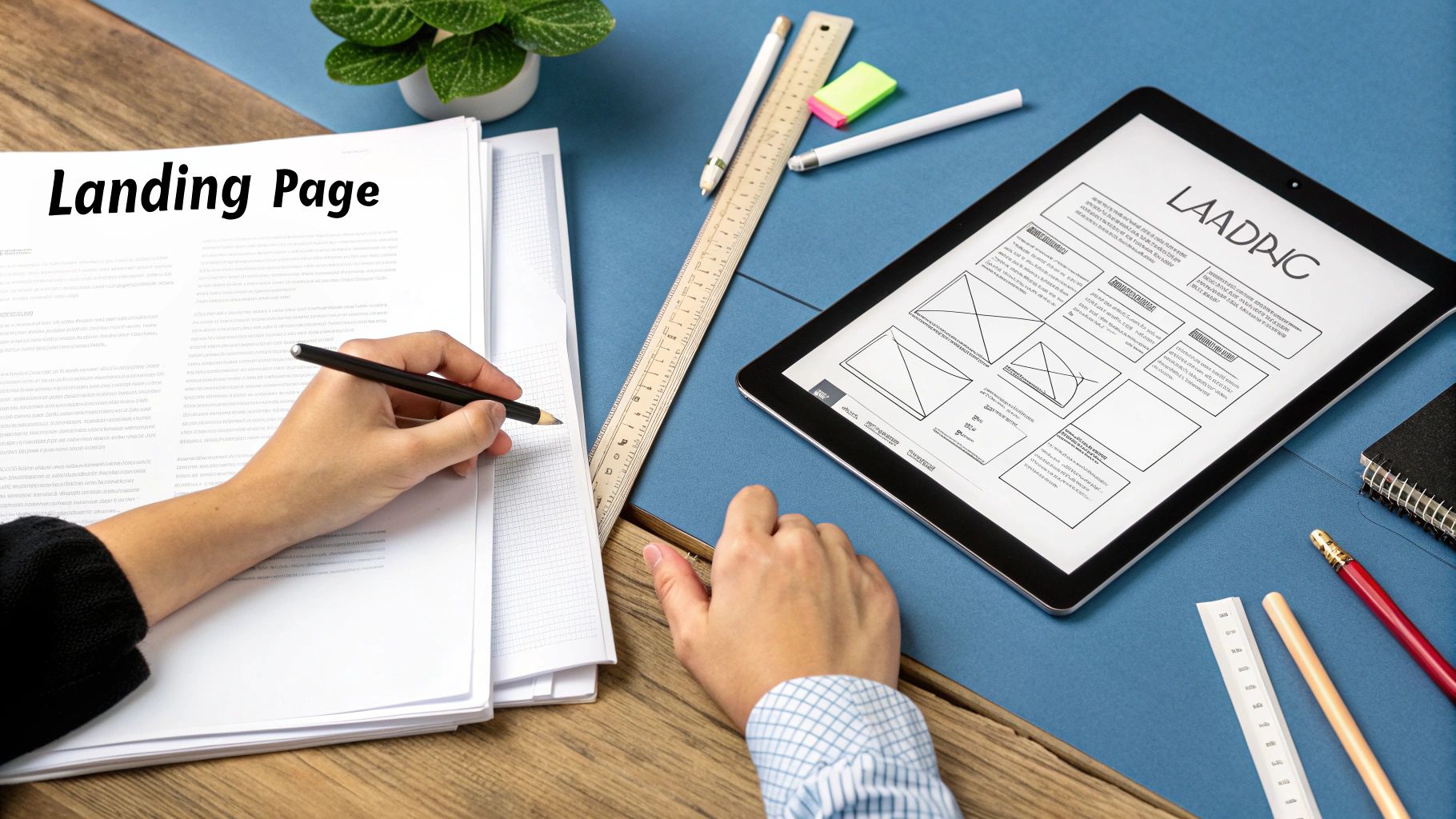
Real pay per click optimization isn't just about keywords and bids; it’s about understanding human psychology. Those few lines of ad copy are your only shot to connect with a potential customer and earn their click. It's a skill often lost in the template-driven world of big agencies.
Too many agencies fall back on generic, feature-focused copy that reads like a corporate brochure. Their goal is cranking out ads at scale, which leads to predictable, uninspired text that just blends in.
As a dedicated consultant, I take a completely different track. My job is to get inside your customer's head, figure out their real pain points, and write a message that speaks directly to them. This is where a small, experience-guided change in language can create a huge lift in results.
Moving from Features to Pain Points
The most common mistake I see is ad copy that just lists what a product is instead of what it does for the customer. An agency might write a headline like, "Durable Waterproof Hiking Boots." Sure, it's accurate, but it’s not compelling.
A better approach focuses on the problem. What is the hiker actually worried about? Blisters on a long trek? Slipping on wet rocks?
My consultant-led process digs into these pain points:
The Agency Headline: "Durable Waterproof Hiking Boots"
My Expert Headline: "Hike All Day, No Blisters. Guaranteed."
The Agency Description: "Our boots feature Gore-Tex lining and high-traction outsoles."
My Expert Description: "Tackle any trail with confidence. Our waterproof design keeps your feet dry and comfortable, mile after mile. Stop worrying about your feet and start enjoying the view."
The second version connects on an emotional level. It sells the outcome, not just the product. That requires a deeper understanding of your customer—something you just can't get with a cookie-cutter approach.
The Power of Continuous A/B Testing
Great ad copy is never a "one-and-done" deal. It's the result of relentless testing. This is another spot where agencies often drop the ball, maybe running a simple test once a quarter. As a hands-on consultant, I treat A/B testing as a continuous, core activity.
We don't just test one headline against another. I test different angles, emotional triggers, calls to action, and unique offers.
The goal of A/B testing isn't just to find a "winner." It's to generate data-backed insights into what your audience truly values. Every test, win or lose, teaches us something new we can apply across the entire account.
For one e-commerce client, we tested a "Free Shipping" offer against a "10% Off" discount. The result? Free shipping boosted the click-through rate by 15% and the conversion rate by 9%. The agency they worked with before had never bothered to test this, leaving a ton of money on the table.
Using Ad Extensions and Customizers Like an Expert
Ad extensions and customizers are incredibly powerful for making your ads stand out, but they need active management. My hands-on approach ensures these are used to their full potential, while agencies often set them up once and then forget them.
Here’s how my expert approach makes a difference:
Feature | Standard Agency Approach | My Expert Consultant Approach |
|---|---|---|
Sitelink Extensions | Generic links like "About Us" or "Contact." | Strategic links to specific product categories or high-converting landing pages. |
Callout Extensions | Vague claims like "Quality Service" or "Trusted." | Specific, compelling points like "Free 2-Day Shipping" or "24/7 Customer Support." |
Ad Customizers | Rarely used because setting up data feeds is "too complex." | Used to dynamically insert a user's city, a countdown for a sale, or specific pricing into the ad. |
Imagine a potential customer sees an ad that says, "Fast Service in Burlington" instead of just "Fast Service." That tiny bit of personalization, powered by an ad customizer, makes the ad dramatically more relevant and boosts click-through rates.
This is the granular, hands-on work that defines true pay per click optimization. It’s also what separates a dedicated, specialist consultant like me from a bloated, impersonal agency.
Winning with Smarter Bidding and Budget Control
This is where the real money is made or lost. Strategic bidding and proactive budget management are where my value as a dedicated consultant truly explodes. It’s not about just spending your monthly budget; it's about turning that budget into a powerful, predictable profit engine.
Honestly, this is one of the biggest gaps I see between a hands-on specialist and the 'set it and forget it' style so common at bloated agencies. They often just flip on an automated bidding strategy like Target CPA because it’s scalable and takes less work on their end.
But the key isn't just knowing what these strategies are. It's knowing precisely when and why to use each one—or when to pull back and use manual bidding for absolute control. Making that call requires a deep understanding of your business's cash flow, sales cycle, and profit margins. That's a level of detail a junior account manager juggling 20 clients will never have.
Beyond the Automated Defaults
Effective pay per click optimization means going far beyond the basics. While automated bidding has its place, the real performance gains come from applying advanced techniques that most agencies simply don’t have the time or skill to implement.
This is what I mean by proactive management, not passive account monitoring. I focus on layering strategies to squeeze every last drop of performance from your ad spend:
Strategic Bid Layering: This is about combining different targeting methods for maximum impact. For instance, I might bid much more aggressively for a user who is on a high-intent remarketing list and is actively searching for one of your core "money-making" keywords. This ensures your top dollar goes directly to the most qualified traffic imaginable.
Proactive Dayparting: Why run ads 24/7 if your customers only buy from 9 AM to 5 PM on weekdays? I dig into your conversion data to find the exact days and hours your customers are most likely to convert. I then crank up the bids during these peak times and pull back or even pause them during quiet periods, cutting out wasted spend.
Granular Geo-Targeting: An agency might just target an entire state and call it a day. I’ll go deeper, analyzing your data to find the specific zip codes, cities, or even radii around physical locations that drive the most profit, then concentrate your budget right there.
This level of detail is a world away from the typical agency model, which often prioritizes managing accounts at scale over maximizing any single client's profitability. For more on this, check out our expert's guide on how to optimize Google Ads and beat bloated agencies.
Adapting to the Broader PPC Market
Smart budget control also means keeping an eye on the entire advertising landscape. The competition is fierce. PPC ad spending has exploded across the board, with platforms like TikTok seeing mind-boggling growth from $1 billion to $13 billion in just a few years.
Meanwhile, Google Ads spending is projected to hit around $208.25 billion globally. This isn't just a number; it represents intense competition for every click.
Spending habits also vary wildly. About 43% of startups spend between $100 and $5,000 per month. This figure is similar for small businesses (33%) but drops off for large enterprises (19%), which often have much larger budgets. These trends, highlighted in PPC statistics on Reboot Online, show why a one-size-fits-all approach is doomed to fail. Your strategy has to be sensitive to both your budget and the market you're competing in.
An agency’s primary goal is often to spend your full retainer. My goal is to make every single dollar of that spend work as hard as possible for your bottom line. This fundamental difference in philosophy dictates every bidding and budget decision made on your account.
My focus is always on your profitability. By combining deep analysis with advanced bidding tactics and a sharp awareness of market trends, I can transform your ad spend from a simple expense into your most reliable source of business growth. It’s a hands-on, strategic partnership that a large, impersonal agency simply cannot replicate.
Your Questions on Hiring a PPC Consultant Answered
Making the leap from a big, impersonal agency to a dedicated PPC consultant is a smart move, but it almost always brings up a few key questions. It’s a big decision, and you absolutely should feel confident about where your marketing budget is headed.
Let's cut through the noise and tackle the common concerns businesses have when they consider a more specialized approach to pay per click optimization. This isn’t just about swapping vendors; it's about upgrading your entire strategy from a volume-based model to a true, value-based partnership.
How Can One Consultant Outperform an Entire Agency Team?
This is the question I get most often, and the answer is surprisingly simple: it all comes down to focused expertise versus diluted attention.
When you sign with a big agency, they sell you on the idea of a huge team. The reality? Your account is probably managed by a junior employee following a standard playbook. That senior strategist—the real expert you thought you were getting—might only glance at your account for a few minutes a month while juggling dozens of others. You end up with just a tiny fraction of their actual expert time.
With an independent consultant, you get 100% of my expert focus. My success is directly and transparently tied to your results. That creates a powerful alignment of interests that just doesn't exist in a corporate structure. I can be more agile, make smarter strategic decisions, and apply my full experience to your account every single day. There’s no corporate overhead, no layers of management, and no risk of your account being passed off because of the high staff turnover that plagues large agencies.
Is Hiring a Consultant More Expensive Than an Agency?
This really depends on how you measure cost. Are you just looking at the monthly retainer, or are you looking at the total value and return you get on your investment?
Agencies have massive overhead—sales teams, multiple layers of management, slick downtown offices—and all of it gets baked into your fee. A huge chunk of what you pay isn't even going toward work on your account; it’s just funding the agency's bloat.
An independent consultant like me runs a much leaner business. That means your investment goes directly into my expert-level work where it belongs. While an agency might quote a retainer that looks lower on paper, it often comes with the massive hidden cost of wasted ad spend from neglect and poor performance.
A consultant’s fee frequently delivers a much higher return on ad spend (ROAS). This makes me the more cost-effective and profitable solution for businesses serious about growth. You pay for results, not for bureaucracy.
What if My Consultant Is Unavailable or on Vacation?
That's a completely valid concern about reliability, but as a professional consultant, my entire business is built on it. I know your campaigns need constant vigilance to perform.
Any planned time off is always communicated well in advance, and I make sure to set up automated rules and continuous monitoring to protect your account while I'm away. Performance alerts are always on, so any unexpected issues get flagged immediately. For any extended absences, I maintain a trusted network of peer experts who can provide backup support if needed.
This is a world away from the agency model, where your main point of contact can disappear overnight due to notoriously high employee turnover. That can leave your account in limbo for weeks, handed over to someone who knows nothing about your business or your goals. For a more detailed breakdown, check out our article on why hiring a senior Google Ads consultant beats working with a bloated PPC agency.
How Will I Know if the Consultant Is Driving Results?
Success should be measured against your actual business goals, not the fluff metrics like clicks and impressions that agencies love to feature in their generic reports.
I start by establishing clear Key Performance Indicators (KPIs) with you from day one. These are the numbers that actually move the needle for your bottom line, such as:
Target Cost Per Acquisition (CPA)
Return On Ad Spend (ROAS)
Lead-to-Close Ratio
Customer Lifetime Value (LTV)
From there, reporting is completely transparent and customized to show progress against these specific goals. My reports don't just tell you what happened; they explain the 'why' behind the numbers and outline the next strategic steps. It's about delivering actionable insights you can use to make better business decisions—something a templated agency report will never give you.




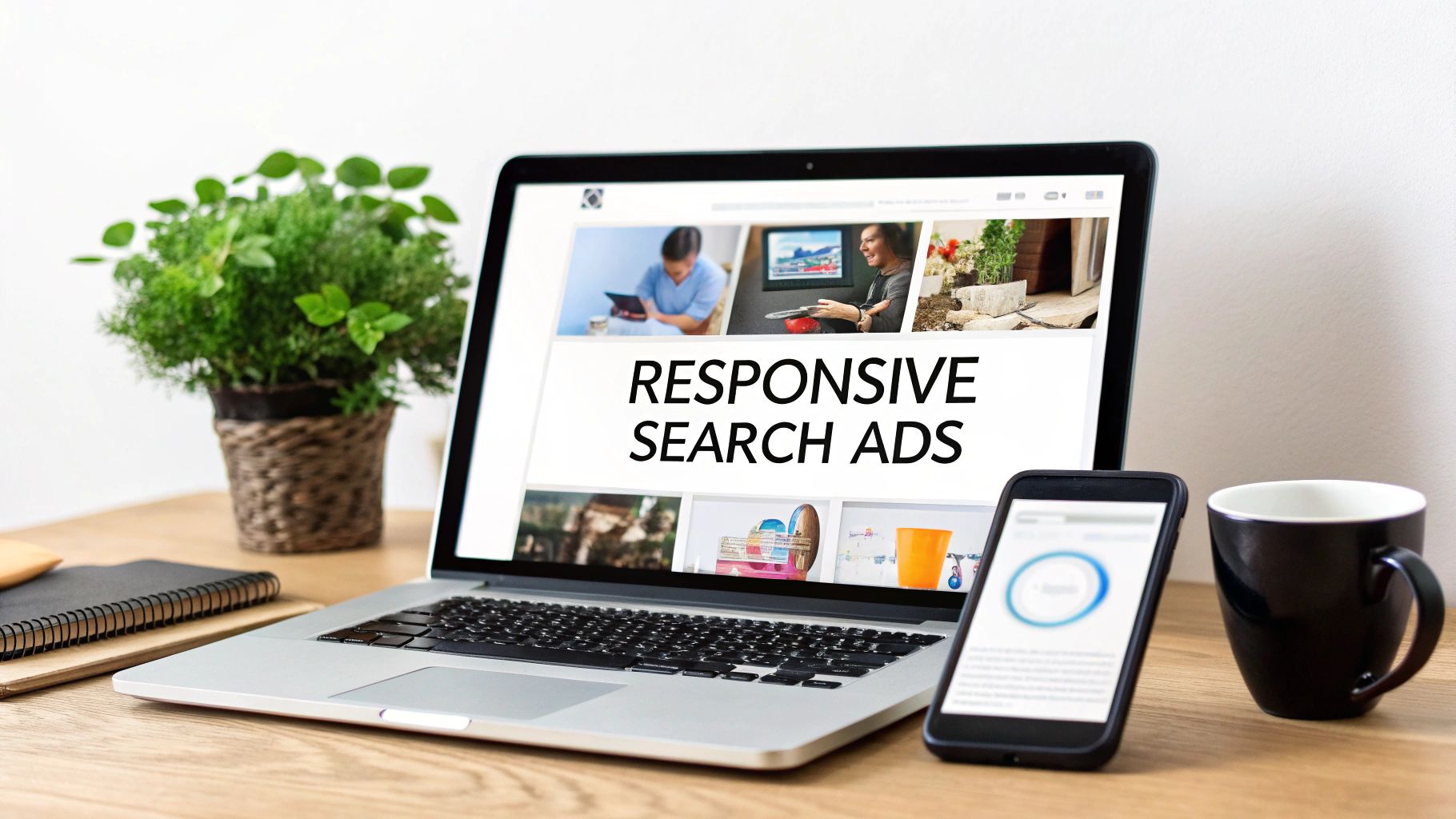
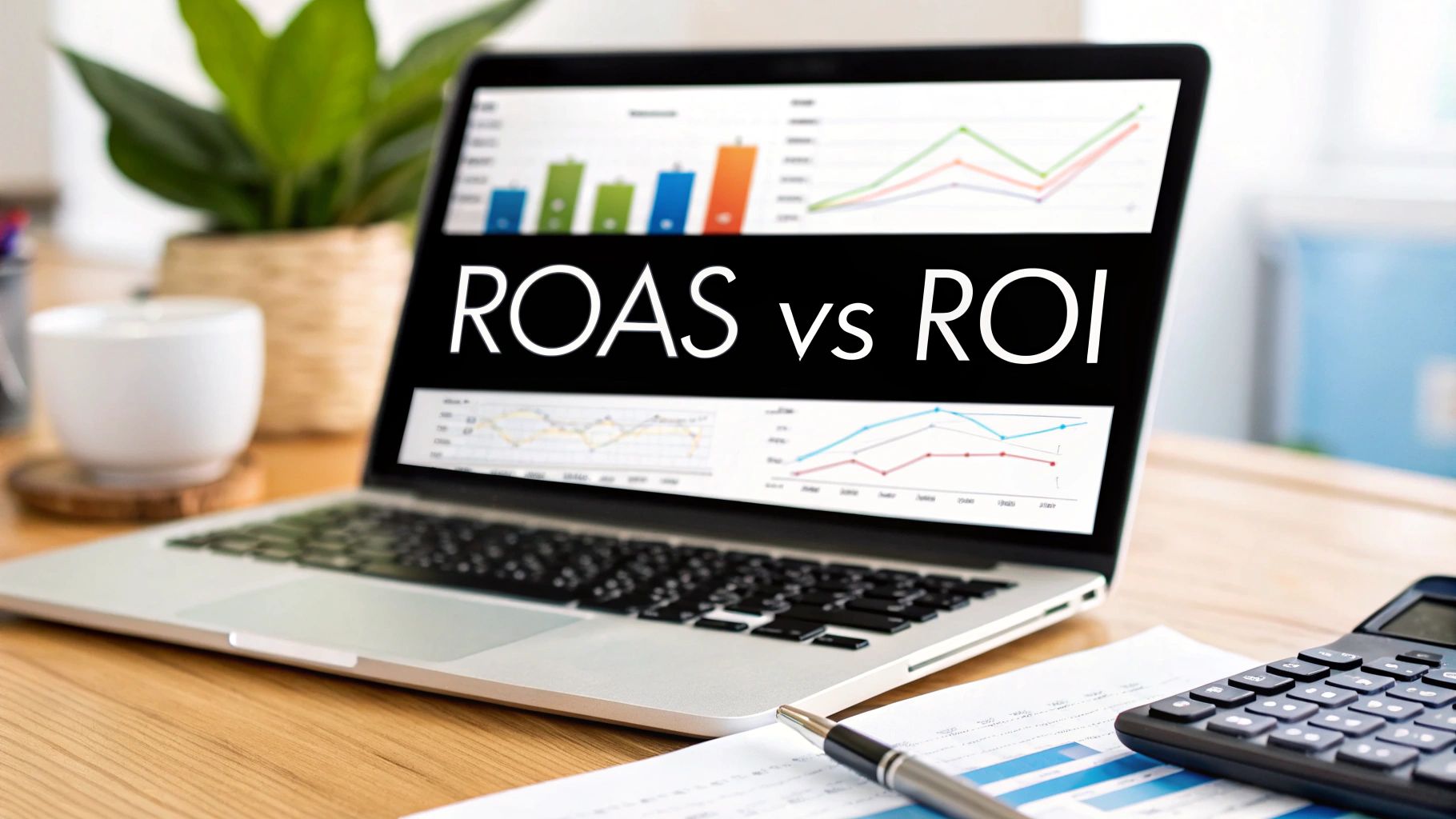
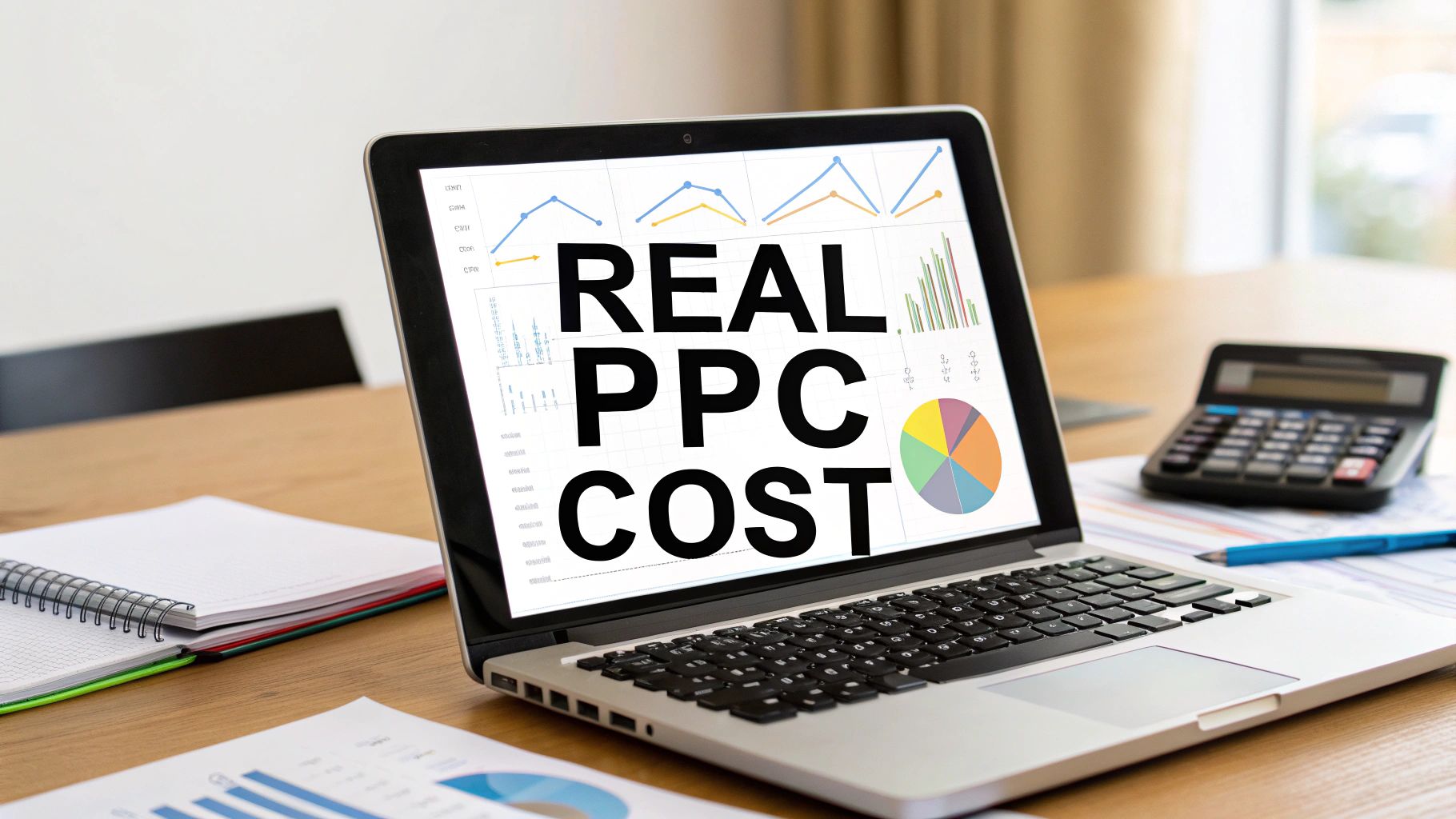
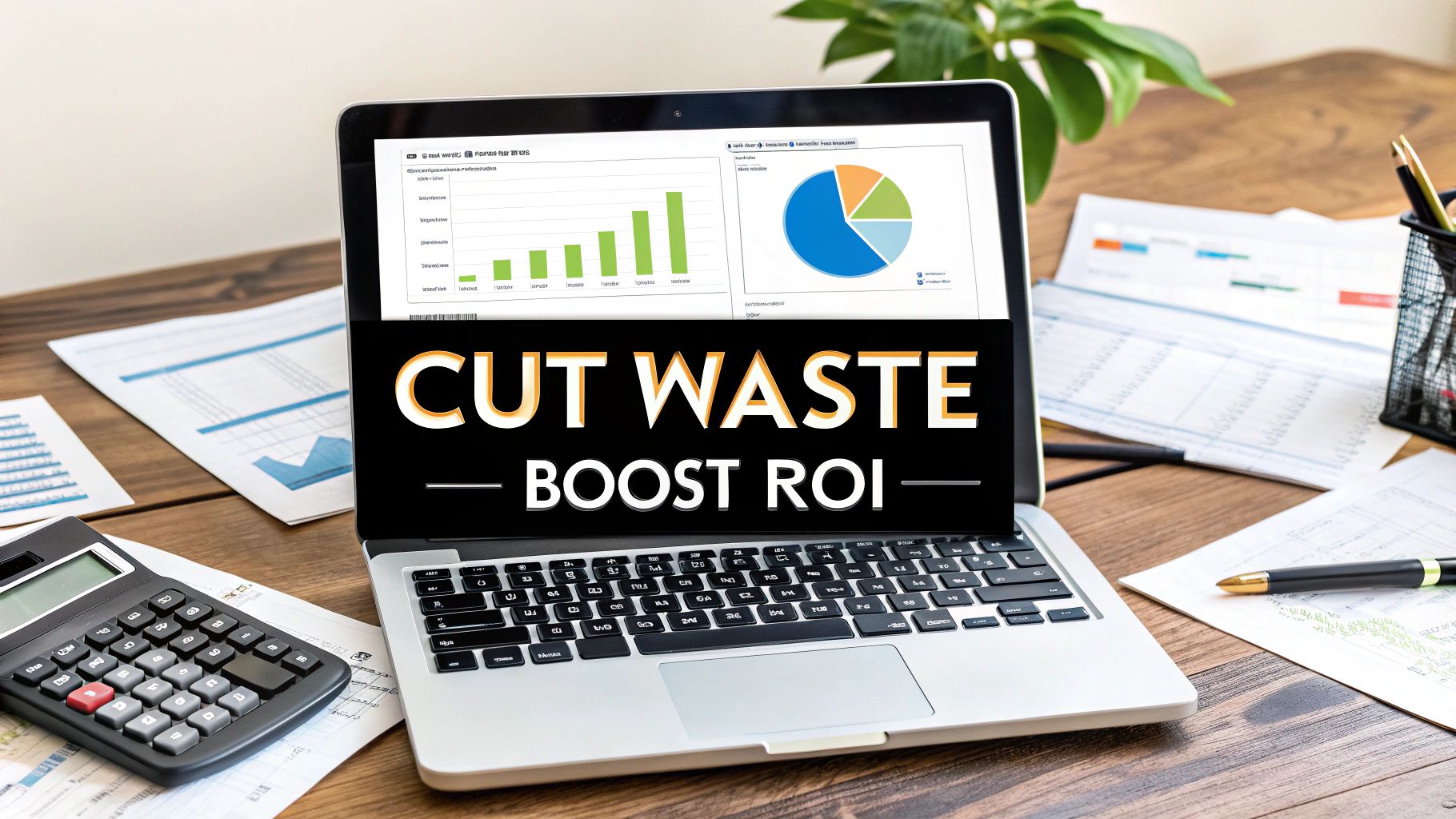
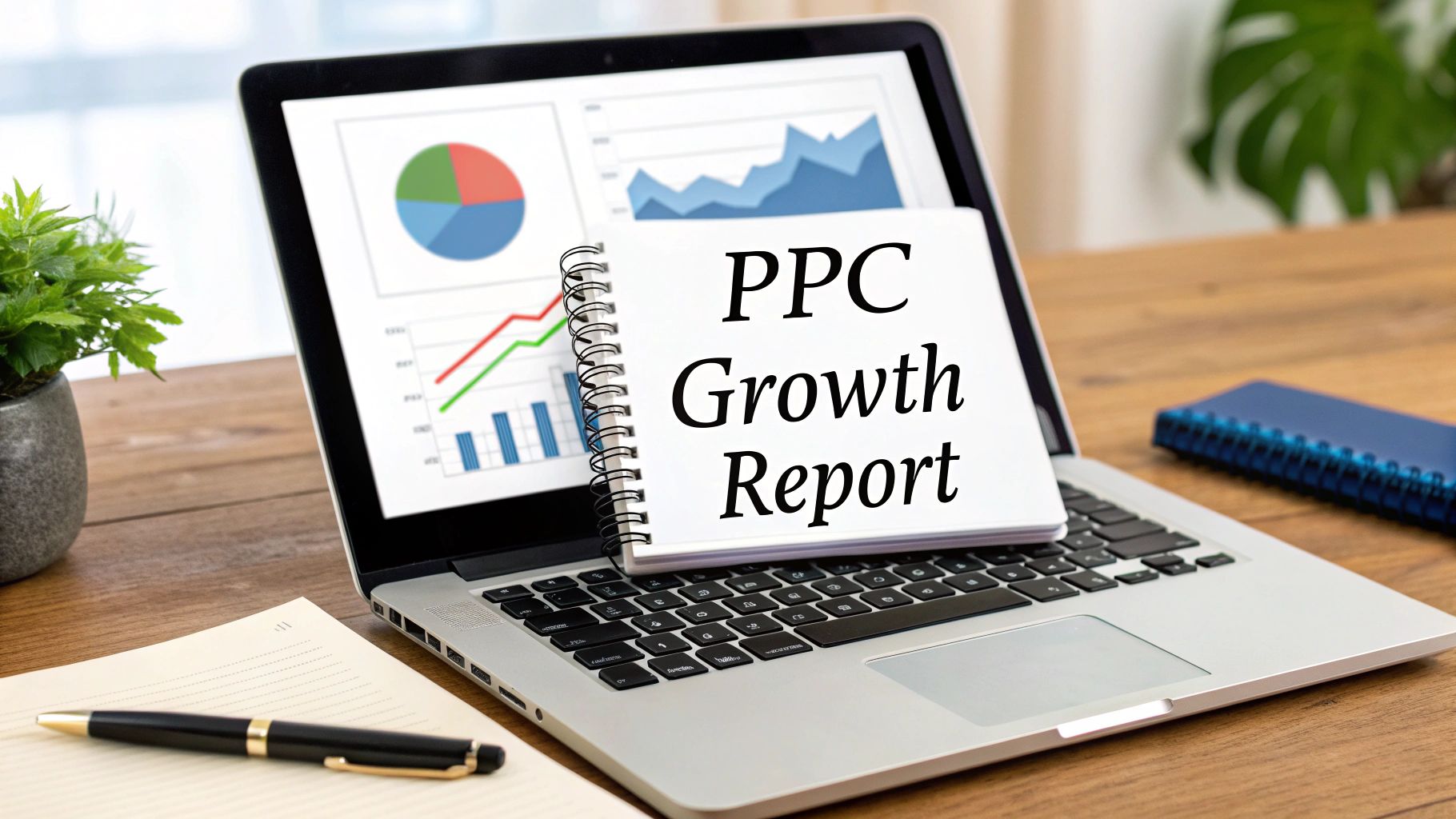
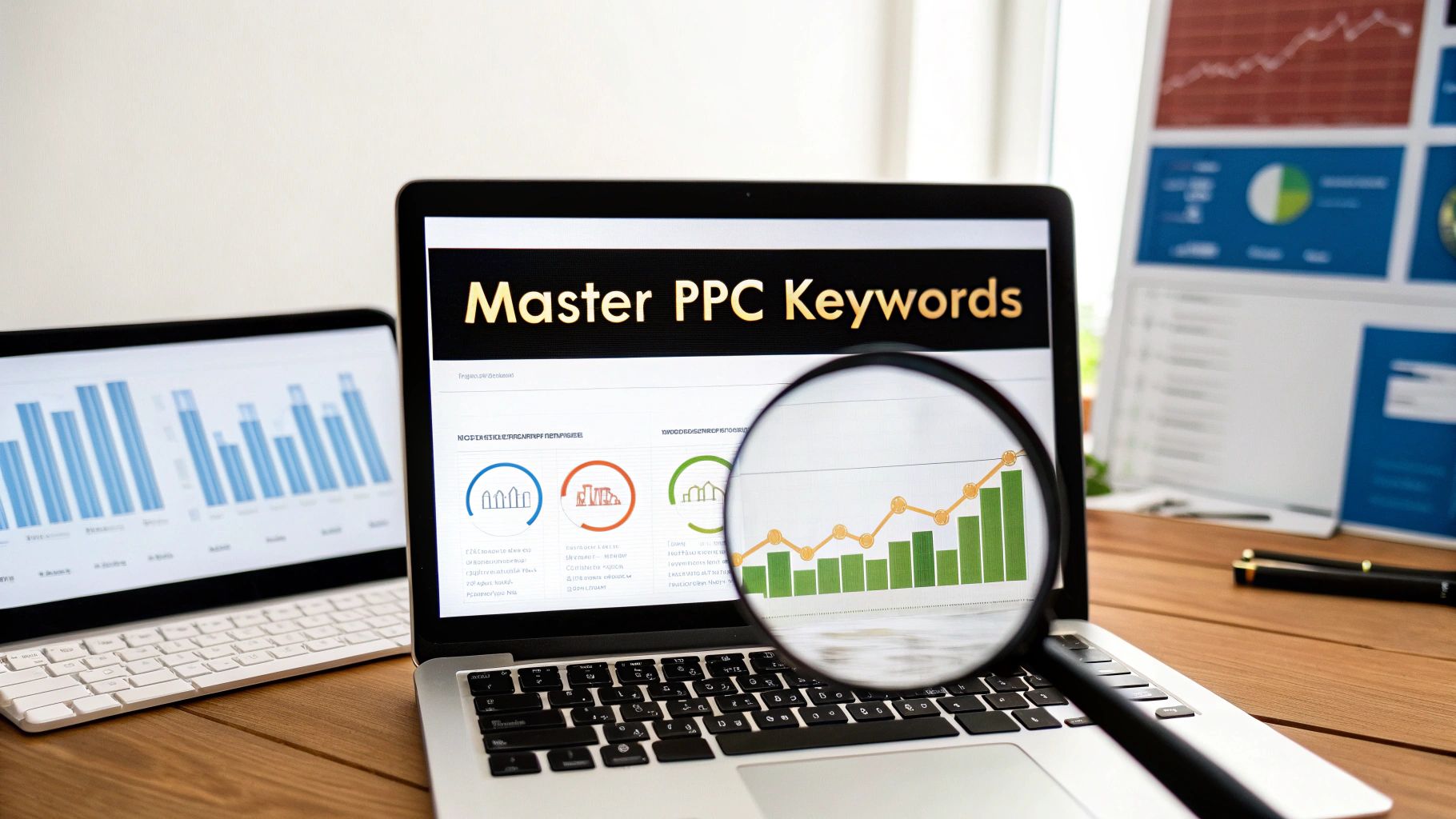
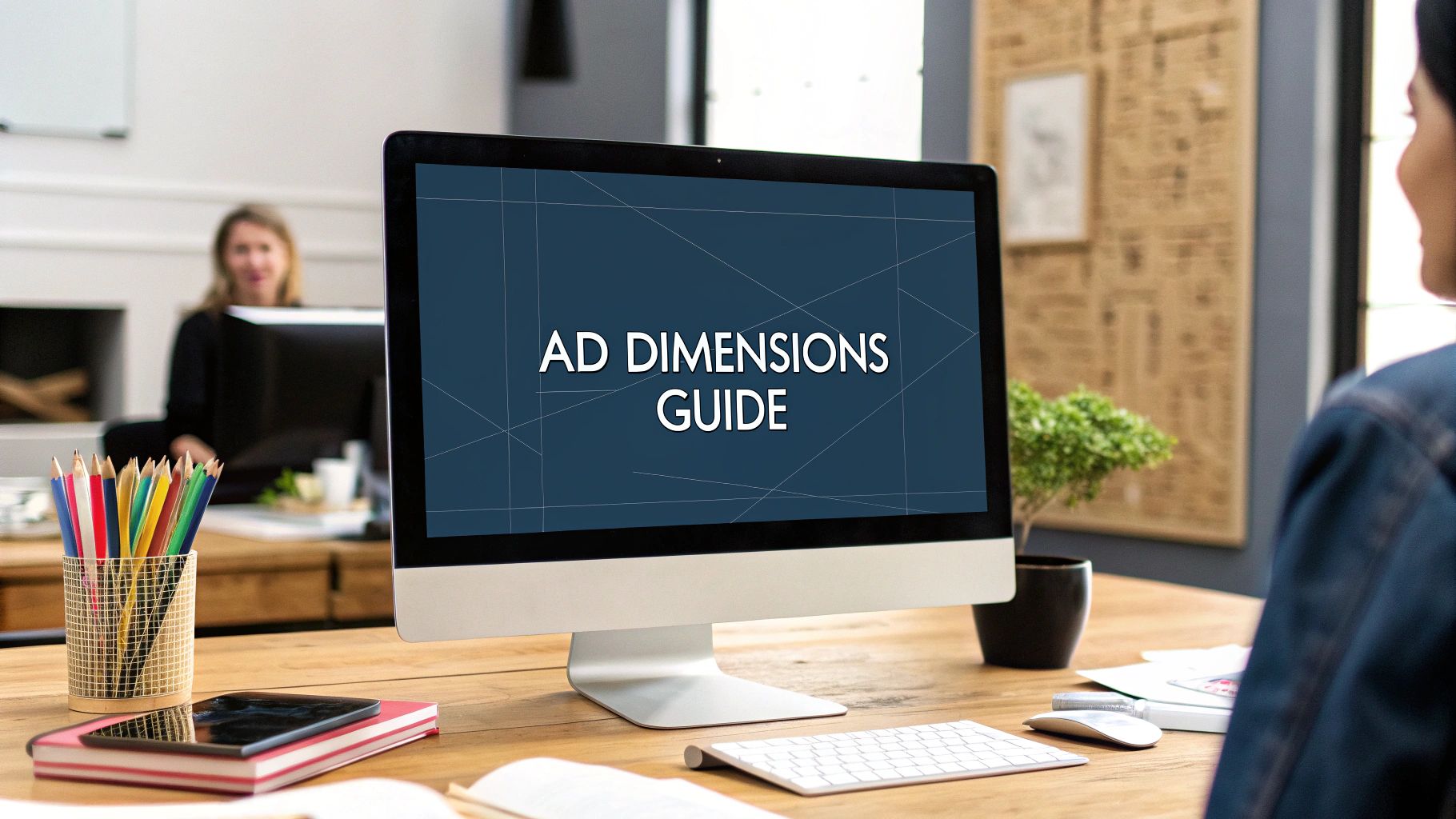
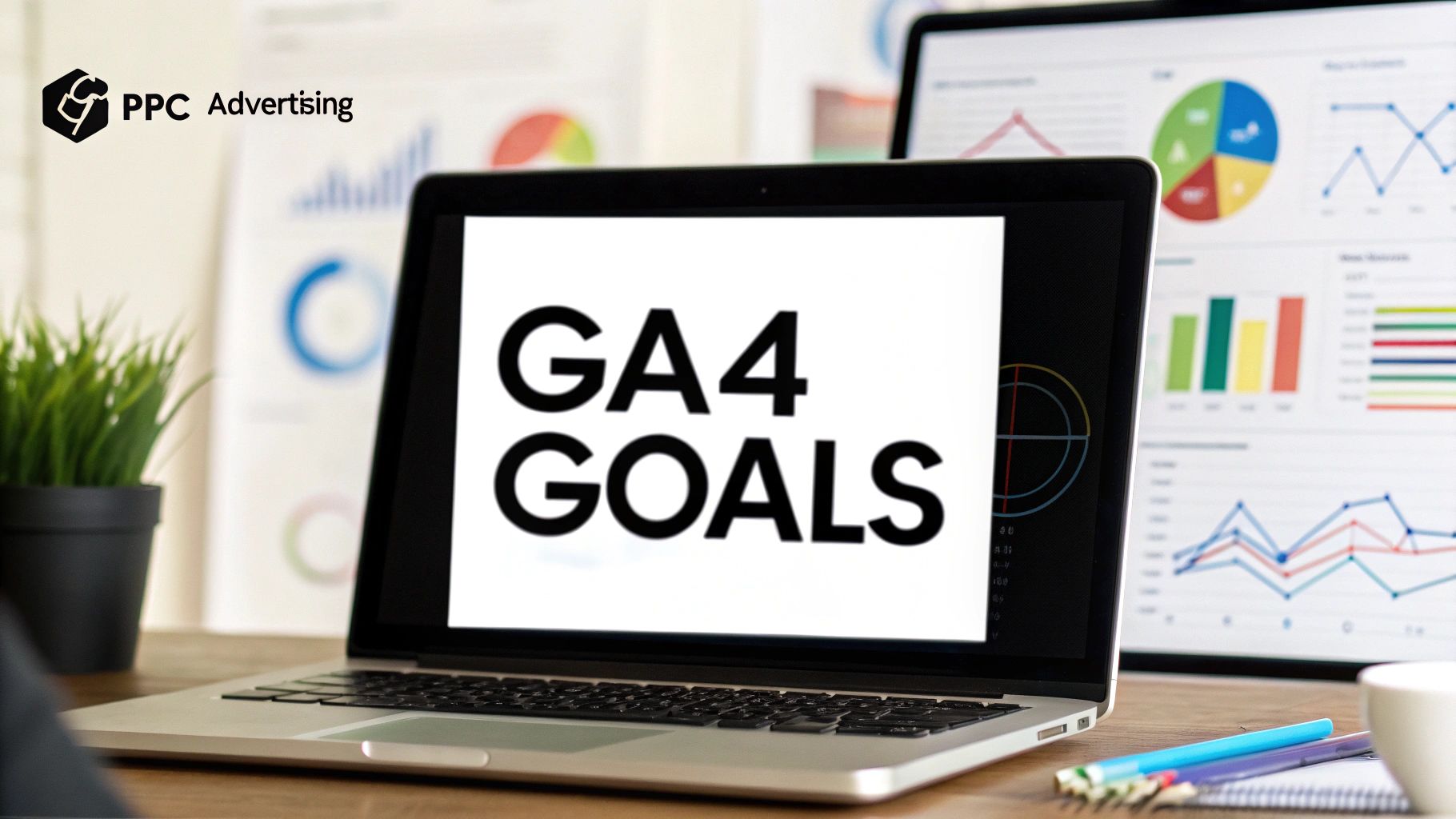
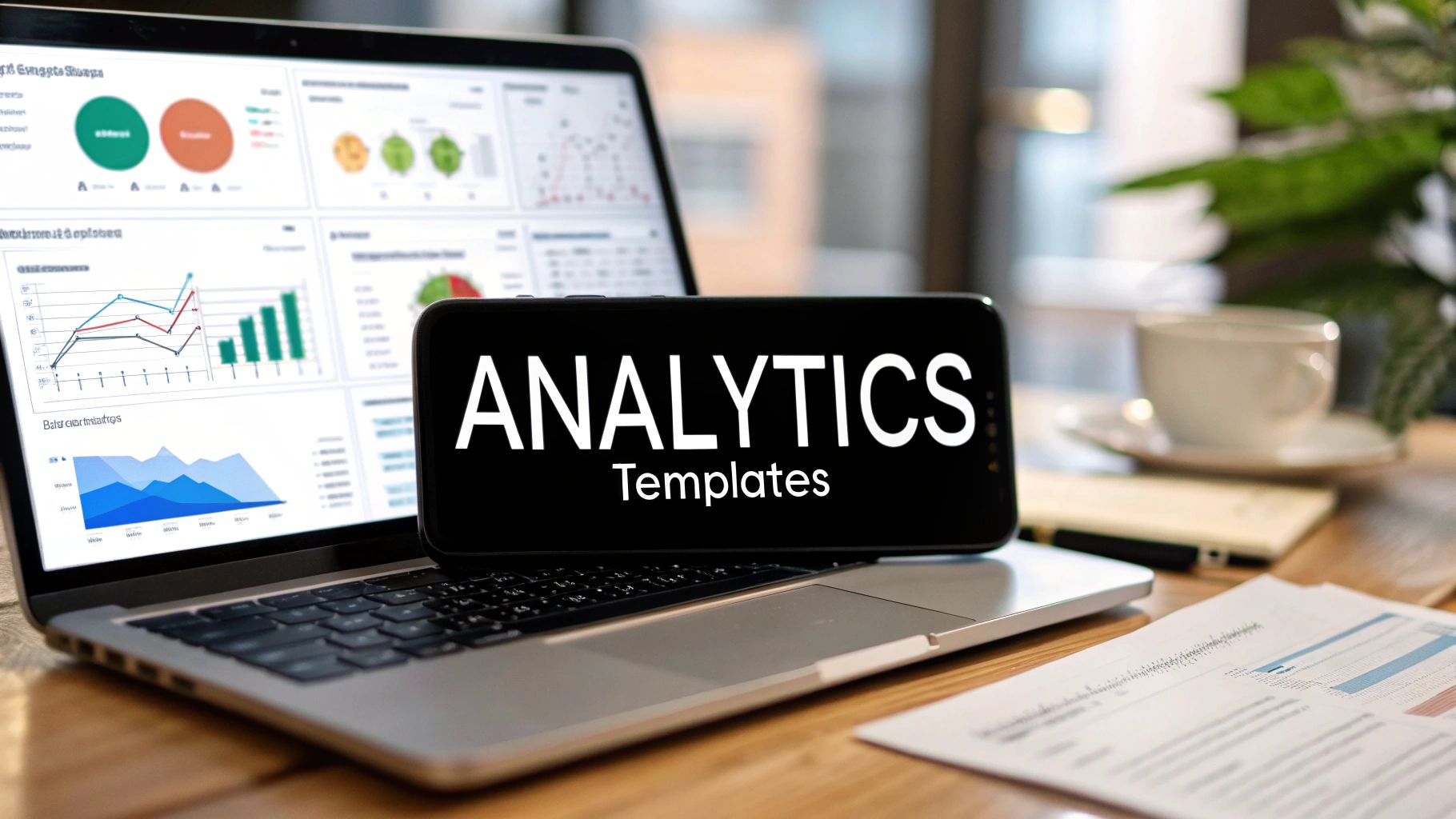
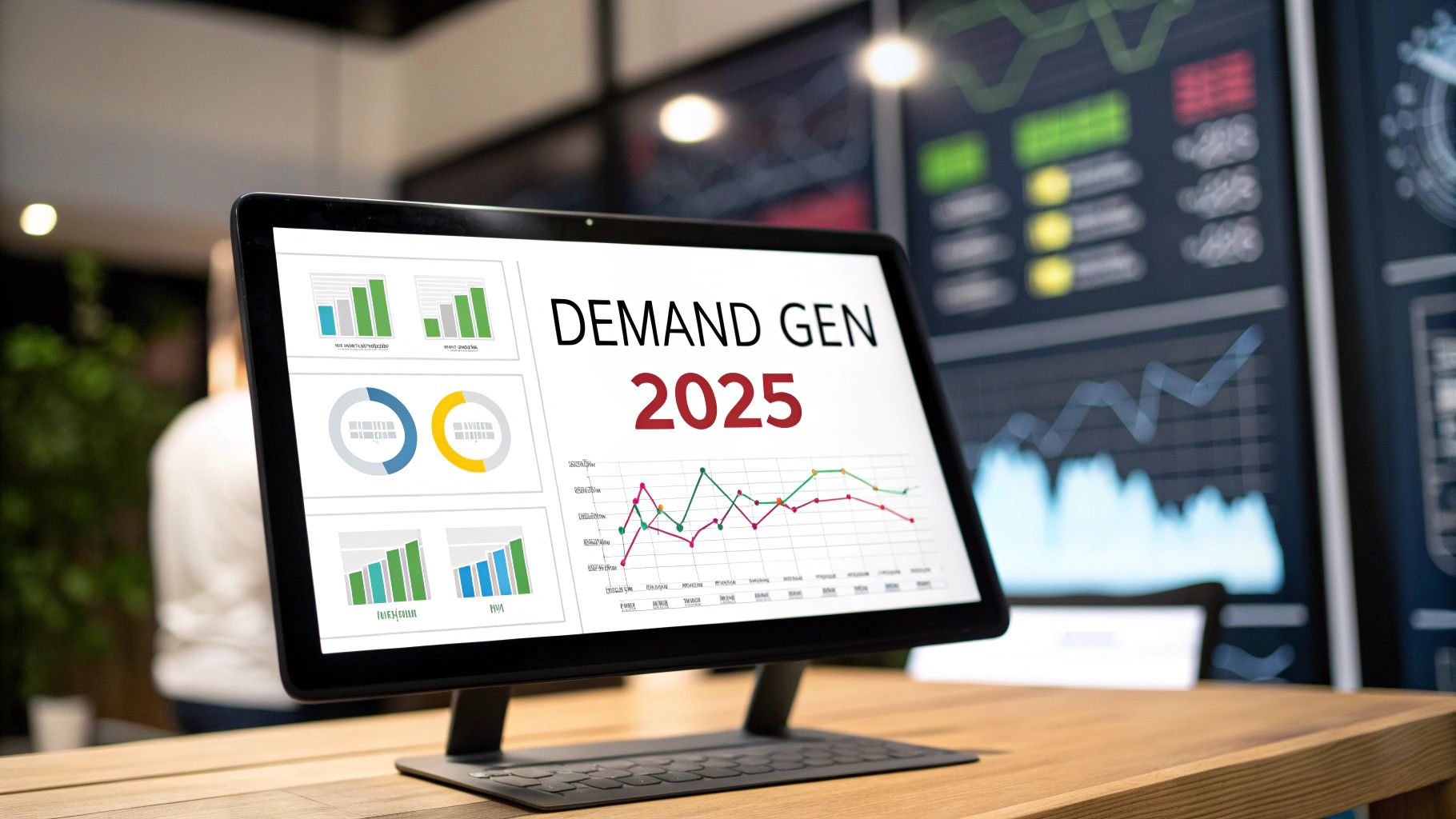
Comments